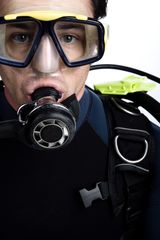How to Avoid Jaw & Tooth Injuries While Being Active This Summer

This summer, go out and live life to the fullest—but make sure to take care of your jaw and teeth! Some activities can damage them, but, luckily, there are plenty of ways to enjoy sports while avoiding injury. Oral Surgery Associates of Alaska, Anchorage’s leading practice for advanced oral health, shares tips for a few, particularly risky summer activities—diving, swimming, soccer, and football.
Here’s how to keep your smile protected, no matter how extreme your summer gets.
Contact Sports Safety
 1. Wear A Custom Mouthguard
1. Wear A Custom Mouthguard
Many contact sports can result in tooth and jaw injuries. To protect your teeth, wear a mouthguard, especially if you have braces. Many types are available, though the best ones are custom-fitted rather than stock.
2. Wear A Facemask & Headgear
Some of the roughest contact sports aren’t typically played with headgear, but doing so will help you avoid facial and oral surgery. Whether you’re playing hockey, football, soccer, or rugby, at least give the matter some thought.
Aquatic Sports Tips
1. Visit The Dentist Regularly
Swimmers don’t typically have many contact injuries to worry about, but they do need to consider a phenomenon known as swimmer’s calculus. After continued exposure to chlorine-treated pool water, a swimmer’s saliva will break down faster than usual, resulting in yellowish and brownish tooth stains. The only way to get rid of these is with professional cleanings, which is why it’s particularly important for swimmers to visit their dentist at least every six months.
2. Wear Gum Guards
Obviously, the best way to keep pool water out of your mouth is to keep your mouth closed—but sometimes, that’s easier said than done! Mouth and gum guards will give you extra protection against chlorine contact. It also helps to rinse your mouth with fresh water every time you leave the pool. If you own a pool, the CDC recommends keeping the pH levels between 7.2 and 7.8 to prevent possible damage.
 3. Avoid Diver’s Mouth Syndrome
3. Avoid Diver’s Mouth Syndrome
If you have any large cavities, abscesses, partial root canals, or other mouth issues, you should treat these conditions before you dive. Otherwise, you may experience barodontalgia, or “diver’s mouth syndrome,” which involves significant jaw and tooth pain.
4. Get A Fitted Scuba Mouthpiece
Sometimes diver’s mouth syndrome is caused by biting down on the air regulators too hard. This is why it’s a good idea to get a fitted mouthpiece for your air regulator before getting into your wet suit.
Oral Surgery Associates of Alaska specializes in oral and jaw surgery, including facial trauma. To set up an appointment with the Anchorage oral surgeons, call (907) 561-1430, or visit the website for more information about their services. You can also follow Oral Surgery Associates of Alaska on Facebook and Twitter for more tips on keeping your teeth and gums healthy!
About the Business
Have a question? Ask the experts!
Send your question

